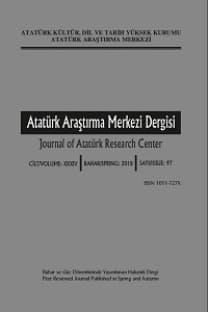Atatürkçü İdeoloji ve Çağdaş İdeolojiler
Atatürk’ü ve Atatürkçü ideolojiyi yeni nesillere anlatmak her şeyden önce Atatürk’ün neden “en büyük” ve neden “vazgeçilmez” bir lider olduğunu açıklamak için gereklidir. Genç nesillere, Atatürk’ün her geçen gün fikri içerikten uzaklaşan, anlamını yitiren anma törenlerinin bir “fetiş”i olmadığını anlatmak gerekir. Atatürk’ü anlatmanın en güvenilir yolu; onun Türkiye Cumhuriyeti’ni kurarken izlediği temel ilkeleri, sahip olduğu değer yargılarını ve amaçlarını açıklamaktır. Bu temel ilkelere, değer yargılarına ve amaçlara “Atatürkçü ideoloji” adını veriyoruz.
Anahtar Kelimeler:
Atatürkçülük, Atatürkçü İdeoloji, Çağdaş İdeolojiler
Atatürkist Ideology and Contemporary Ideologies
Explaining Atatürk and the Kemalist ideology to new generations is first of all necessary to explain why Ataturk is the "biggest" and "indispensable" leader. It is necessary to explain to the young generations that Atatürk's memorial ceremonies, whose ideas are getting away from the content and lose their meaning, are not a “fetish”. The most reliable way to describe Atatürk; Follow the basic principles of the Republic of Turkey establishing his is to explain the value it had jurisdiction and objectives. We call these basic principles, value judgments and goals “Atatürkist ideology”.
Keywords:
Kemalism, Kemalist Ideology, Contemporary Ideologies,
___
- H. KATOUZÎAN, “Ideology and Method in Economics”, The MacMillan Press, Londra, 1980, s. 149
- I. ADELMAN, “Ekonomik Büyüme ve Kalkınma Teorileri” (çev. Vural Savaş) İs¬tanbul, 1972, s. 64
- J. A. SGHUMPETER, “History of Economic Analysis” George Ailen Unwın Ltd. Sekizinci Baskı, London, 1972, s. 35
- J. GOULD, “A Dictionary of The Social Sciences” (Eds., J. Gould-W.L. Kolb), Free Press, New York, 1964, s. 315-317
- H.M. JOHNSON, “International Encylopedia of the Social Sciences” (Ed., D.L. Silis), The Macmillan Co,-Free Press, New York 1972, Vol. 7-8, s. 76-84
- C. GEERTZ, “Ideology as a Cultural System” iç. “İdeology and Discontent” (ed., D.E. Apter), Free Press, New York 1964, s. 47-76
- “Ideologies Stir P.E.N. Delegates” New York Times, June 18, 1966, s. 18 (H.M. JOHNSON, age., s. 76’dan)
- R.L. MEEK, “Economics and Ideology and Other Essays” Chapman Hail, London 1967, s. 198-224
- J. ROBINSON, “İktisat Felsefesi”, (Çev. V. SAVAŞ), M. Ü. İkt. îd. B. F. Yayın No: 366, İstanbul, 1984, s. 7
- J. PLAMENATZ, “Ideology” Prager, New York 1970, s. 15
- A. GERSCHENKRON; “Ideology as a System Determinant” İç. “Comparison of Economic Systems” (ed., A. Eckstein Irwin, New York, 1974, s. 274
- T. PORSONS, “An Approach To The Sociology of Knowledge İç. “World Congress of Sociology” Vol. 4, 1959, s. 25-49 (JOHNSON agmk.’den)
- F.X. SUTTON, “The American Business Creed” Cambridge, Mass. Harvvard Uni- versity Press, 1956 (JOHNSON, age.’den)
- E. SHILS, “The End of Ideology” Encrunter, 5, No. 1955 s. 52-58. (S.M.LIPSET, “Political Man” Heinemann, London 1976, s. 403’den)
- S. KİLİ; “Atatürk Devrimi” Türkiye İş Bankası Kültür Yayınları, No: 221, Ankara 1981, s. 218 ve devamı
- V. SAVAŞ, “Çağdaş İdeolojiler ve Atatürkçülük ideolojisi” Türkiye Ekonomisi ve Türk Ekonomi ilmi M.U. Türkmer, İstanbul, 1986 D. AVCIOGLU; “Türkiye’nin Düzeni” Bilgi Yayınevi, Ankara, 1968, s. 127 İ. İNÖNÜ, “Devlet Kurucusu Atatürk” Atatürk Konferansları III, 1969, Türk Ta¬rih Kurumu, XVIII. Seri, sa. 3 Ankara 1970, s. 16 A.Afet İNAN, “İzmir İktisat Kongresi 17 Şubat-4 Mart 1923” Türk Tarih Kurumu yayınlan, XVI. Dizi, s. 46, Ankara 1982, s. 68
- R.C. MACRIDIS, ae W.EBENSTEIN, “Today’s Isms” 6. Baskı Prentice Hail, New Jersey 1970
- V, SAVAŞ, “Piyasa Ekonomisi ve Devlet” Beta Yayınevi, İstanbul, 1987.
- ISSN: 1011-727X
- Yayın Aralığı: Yılda 2 Sayı
- Başlangıç: 1984
- Yayıncı: Atatürk Kültür, Dil ve Tarih Yüksek Kurumu Atatürk Araştırma Merkezi
